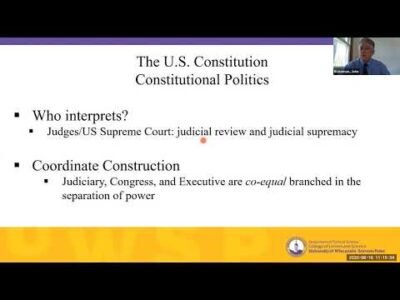If you read your whole Old Testament, you never see a demon being cast out of anyone. Ever. How in the world when Jesus shows up and he starts doing that? Did people automatically in their heads think: “Well, this is what the Messiah is supposed to do! This is a sign of Messiahship.”
Where does that come from? Psalm 91. Which, you know, in recent days, you’ve heard this quoted a lot: “He who dwells in the shelter of the Most High will abide in the shadow of the Almighty… he will deliver you from the snare of the fowler and from the deadly pestilence.
He will cover you with his pinions, and under his wings you will find refuge… You will not fear the terror of the night, nor the arrow that flies by day, nor the pestilence that stalks in darkness.” In the corona environment, this passage gets quoted a lot.
And unfortunately, in some cases deeply out of context to suggest that well, you know, Christians can do whatever they want here because God will protect us and we won’t get sick and. Okay, that is not what the passage is about. The passage is much cooler than that. It’s more sinister too.
Psalm 91 is a psalm that was discovered among the Dead Sea Scrolls in a jar with four other Psalms that are not in the Hebrew Bible. There are extra Psalms among the dead sea scrolls, we have 150 in the Hebrew Bible,
But this one that is in the Hebrew Bible, obviously, was put in this jar with four other ones. All four of those other ones are exorcism Psalm. So well, why would they lump Psalm 91 in there? That doesn’t look like an exorcism to me,
I’m, you read the whole thing and there’s no like casting devils out or anything like that. Well, if you read it in Hebrew, and you were a literate Israelite, you would know that words like pestilence (Deber). Okay, there’s pestilence there. Deber down here, Qeteb (destruction), “the arrow that flies by day.” Okay, right here.
This whole motif of the arrow flying by day and the tear of the night. Right here; Pahad. These are names and titles and epithets of Canaanite deities, all of them. To an Israelite, a Canaanite deity was a demonic, a sinister and evil spirit, you know, a power of darkness. That’s why Psalm 91 was lumped into that
Because this is a prayer of protection and thwarting of powers of darkness in ancient Jewish thought. What else is interesting is this psalm in the Hebrew Bible, you notice there’s no superscription. There’s a psalm of whoever. In the Septuagint, it’s a psalm of David. Okay, also in the Septuagint, there are certain different wordings,
The Septuagint would have been based on a Hebrew text. Is a translation of Hebrew, that don’t always align with a traditional Hebrew text. But in the Septuagint, where it’s a psalm of David, there are a couple of psalms that use specific words for the Psalms, and the hymns and the,
I want to use the word spell, because that’s what it means, or can mean, of David and Solomon. Okay, that in the poetry, the literature, they produced, some of that stuff uses vocabulary that you will find in exorcistic material in the Second Temple period. And so this answers an important question.
And here’s the question. And maybe you’ve wondered this. If you read your whole Old Testament, you never see a demon being cast out of anyone. Ever. There’s actually only two references in English Bibles to demons; Shedim is usually translated demon, which isn’t the greatest translation,
But we’ll run with it for the sake of the illustration, Deuteronomy 32. And then there’s a Psalm. Okay, but you never see a demon or a hostile evil spirit cast out of anyone. How in the world, when Jesus shows up, and he starts doing that, did people
Automatically in their heads think: “well, this is what the Messiah is supposed to do! This is a sign of Messiahship.” Where does that come from? It comes from what I just described. It comes from certain Psalms being associated with David, and a few with Solomon. In the Second Temple Period
There was the belief that David and Solomon had power over evil spirits. And so if the Messiah is a descendant, he is The David, The Son of David, he should be able to do that too. So this is something that we wouldn’t get because we’re not living in the culture.
And we’re not familiar with how Psalm 91 in particular was viewed. But when Jesus shows up and starts doing this, the bells and whistles are going off in people’s heads. This is an important thing he does to convince them that he’s the Messiah. And Isn’t it odd that Satan would choose Psalm 91
To quote to Jesus, in a temptation, and he quotes the part, down here, “he will command his angels concerning you to guard you in all your ways. On their hands they will bear you up, lest you strike your foot against a stone.” So what’s really going on here is Satan is fishing for information.
He’s got Jesus in front of him, he knows who he is, he knows why he’s there. His silly Kingdom of God stuff, okay. But he doesn’t know what the plan is. So he’s there to tempt Jesus. Try to shortcut the thing. And you know, the last one is the worst because it’s idolatry.
It’s just kind of a terrible attempt. But this one’s interesting because let’s say that Jesus looks at Satan and says, “Yeah, that’s a good quotation. Yep. Yep, you know, that’s a, that’s an exorcistic psalm. And I’m the son of David, and I’m supposed to be able to cast out demons.
And if that’s true, then the rest of the stuff in the song must be true too. So go ahead, it’ll take me up to the top here, I’m going to throw myself off.” What happens? Okay, let’s say the angels catch him. What is Satan learned? He can’t kill him,
So we’ll take killing the Messiah off the strategy plan. But Jesus knows, that’s exactly what needs to happen. “So I’m not going to demonstrate anything for you. You’re not going to learn anything in this conversation.” He just tells him that you hit the road, “you shall not put the Lord your God to the test.”
And that could be a reference to himself. But it could also be another way of saying; “You shall not try to convince me to let God show you the hand that he’s going to play.” He has to die. He must die. Again, it’s an interesting tit for tat conversation
between these two. And again, my take on it is that Satan actually was fishing for information. It’s not a worthless conversation. And the fact that he quotes Psalm 91 I find really interesting because of its nature. You know, the servant (Israel) out in the wilderness. I mean, let’s think of Jesus
Now as the representative of the corporate nation. Did Israel in the Old Testament pass the test of being God’s servant? Well, yes, and no. You know, they get to the promised land? Sure, after they fail, and then they wander around for 40 years. So there’s that checkered past. They don’t really complete the conquest.
They ask for a king to replace God as the one who fights for them. And then three kings later they go off and start worshipping other gods and end up in exile. So probably no, they really don’t pass the test of being God’s representative son and his servant, but Jesus does.
He passes the test. And now it’s Game on. His ministry begins.
#Satan #quote #Psalm #Jesus







No comment yet, add your voice below!